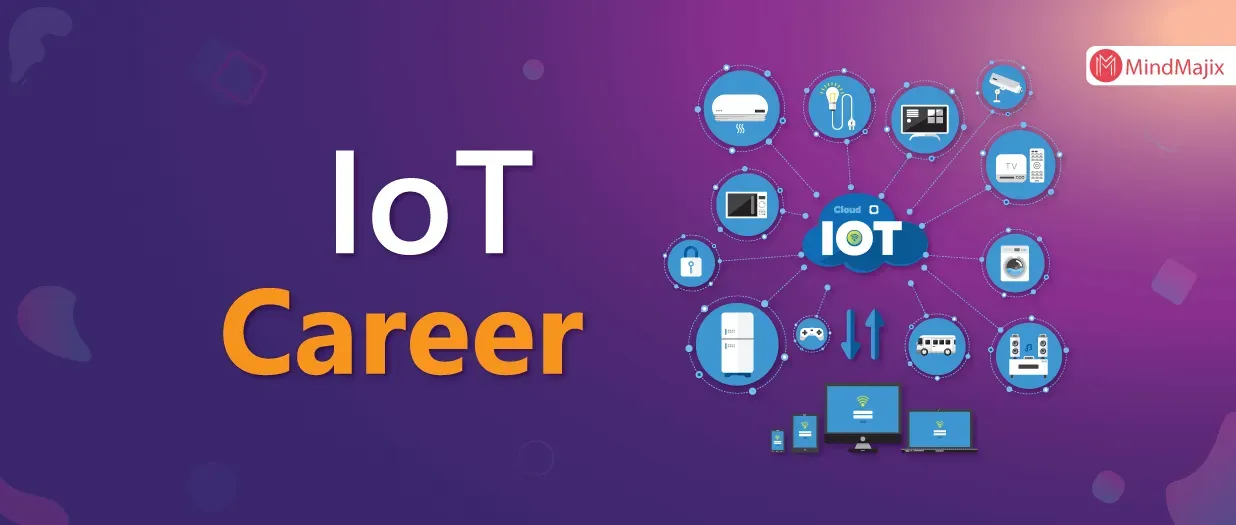IoT jobs are rapidly emerging as one of the most exciting career paths in today’s technology-driven world. With the Internet of Things reshaping industries from healthcare to manufacturing, there is a growing demand for skilled professionals who can navigate this dynamic landscape. Careers in IoT encompass a wide range of roles, each requiring a unique set of IoT skills needed to thrive. As organizations increasingly rely on IoT solutions, understanding IoT job roles and their corresponding salary insights becomes essential for job seekers. Whether you are an aspiring graduate or a seasoned professional, the opportunities in the IoT sector are vast and promising.
The landscape of careers related to the interconnected world of devices, often termed as the Internet of Things, is expanding rapidly. As industries adapt to these advanced technological innovations, a variety of positions have surfaced, ranging from technical roles to managerial positions. The skills required for these IoT roles vary widely, indicating a need for diverse expertise in both hardware and software domains. Moreover, potential job seekers can expect competitive compensation packages, making this field particularly attractive. In this exploration of IoT job opportunities, we will delve into the various functions, responsibilities, and necessary qualifications for success.
Exploring Prominent IoT Job Roles
The Internet of Things (IoT) has opened a myriad of exciting job roles for professionals looking to enter this dynamic field. From Chief IoT Officers to IoT Developers, each position plays a crucial role in shaping the future of connected devices and smart technologies. As industries increasingly adopt IoT solutions, understanding the responsibilities and skills associated with these roles is essential for aspiring candidates. The demand for IoT professionals is soaring, with many companies seeking individuals who can help them optimize their operations through innovative IoT applications.
Each job role in the IoT landscape comes with its unique set of responsibilities and required skills. For instance, a Chief IoT Officer is tasked with developing the overarching IoT strategy for an organization, while an IoT Developer focuses on creating software applications that integrate with IoT devices. With the right skills and expertise, professionals can carve a niche for themselves in the fast-evolving IoT sector, which is projected to see substantial growth in the coming years. As a result, understanding the various IoT job roles is crucial for anyone looking to build a career in this exciting field.
Essential IoT Skills Needed for Success
To thrive in IoT careers, candidates must possess a mix of technical and soft skills. Technical skills often include proficiency in programming languages like Python, Java, or C++, as well as a solid understanding of embedded systems and network protocols. Additionally, familiarity with cloud computing and data analytics can significantly enhance one’s employability in the IoT job market. These skills enable professionals to design, develop, and implement effective IoT solutions that meet the demands of modern businesses.
In addition to technical know-how, soft skills such as problem-solving, communication, and teamwork are equally important in the IoT industry. As IoT projects often require collaboration across various departments, professionals must be able to convey complex technical concepts to non-technical stakeholders. The ability to work collaboratively in diverse teams can lead to successful project outcomes and innovative solutions that push the boundaries of IoT technology.
Salary Insights for IoT Professionals
As the demand for IoT expertise continues to grow, salary insights reveal attractive earning potential for various IoT job roles. According to recent data, positions such as Chief IoT Officer command salaries exceeding $200,000 per annum, showcasing the value that companies place on strategic leadership within the IoT space. Similarly, IoT Architects and Security Engineers also enjoy competitive salaries, with median earnings around $160,000 and $152,000 respectively. These figures highlight the lucrative nature of careers in IoT, particularly for those who develop specialized skills and experience.
Moreover, entry-level positions such as IoT Developers and Systems Administrators offer salaries averaging $84,000 and $95,000 per annum. As the IoT industry matures, professionals can expect significant salary growth as they gain experience and take on more complex responsibilities. The evolving landscape of IoT careers not only provides competitive compensation but also presents numerous opportunities for advancement and specialization in areas such as data security, hardware engineering, and embedded system design.
The Growing Demand for IoT Professionals
The rapid advancement of IoT technology has resulted in an increasing demand for skilled professionals in various sectors. Industries such as healthcare, finance, and manufacturing are adopting IoT solutions to enhance operational efficiency and create innovative products. This surge in adoption translates to more job openings for aspiring candidates who are keen to make their mark in the IoT field. As organizations continue to recognize the benefits of IoT, the opportunities for career growth and development in this area are expanding.
Furthermore, as IoT technology evolves, new job roles are emerging, creating even more pathways for professionals to explore. From roles focused on data analytics and cybersecurity to those centered around hardware design and system administration, the diversity of IoT job roles means that there is something for everyone. For job seekers, staying updated on the latest trends and skills required in the IoT space is essential to take advantage of the growing demand and secure a fulfilling career in this innovative field.
Career Pathways in the IoT Sector
Establishing a career in the IoT sector can take various paths, depending on individual interests and skills. For those with a background in software development, transitioning into an IoT Developer role may be a natural fit. Alternatively, individuals with a strong interest in hardware may find opportunities as IoT Hardware Engineers or Embedded Systems Designers. Understanding where your skills align can help guide your career pathway within the IoT ecosystem.
Professional development plays a crucial role in advancing one’s career in IoT. Pursuing certifications in relevant technologies, attending industry conferences, and engaging in networking opportunities can significantly enhance career prospects. Additionally, continuous learning about emerging IoT trends and technologies will keep professionals competitive in a rapidly changing job market. By strategically navigating career pathways in the IoT sector, individuals can position themselves for long-term success and fulfillment.
The Impact of IoT on Various Industries
The Internet of Things is transforming industries across the board, creating new opportunities for innovation and efficiency. In healthcare, for instance, IoT devices are enabling remote patient monitoring and real-time data collection, leading to improved patient outcomes and streamlined operations. Similarly, in manufacturing, IoT solutions such as predictive maintenance and smart logistics are enhancing supply chain management and reducing operational costs. The impact of IoT extends beyond these sectors, influencing finance, agriculture, and smart cities, showcasing its versatile applications.
As industries continue to integrate IoT technology into their operations, the demand for professionals with specialized skills will rise. This opens up opportunities for job seekers to engage in meaningful work that not only advances their careers but also contributes to societal progress. Understanding the impact of IoT on various industries can help aspiring professionals identify the sectors they are most interested in, aligning their career goals with the evolving needs of the job market.
Future Trends in IoT Employment
Looking ahead, several trends are expected to shape the future of IoT employment. One of the most significant trends is the increasing emphasis on cybersecurity within the IoT sector. As more devices become interconnected, the potential for security threats grows, leading to a surge in demand for Security Engineers and other professionals skilled in protecting IoT systems. Additionally, with the rise of edge computing, new roles will emerge that focus on processing data closer to the source, reducing latency and enhancing efficiency.
Moreover, the growing focus on sustainability and green technologies is likely to influence IoT job roles. Companies are seeking ways to leverage IoT solutions to reduce energy consumption and minimize environmental impact. This trend will create opportunities for professionals who can develop and implement eco-friendly IoT solutions, aligning their careers with global sustainability goals. By staying informed about these future trends, aspiring IoT professionals can position themselves to seize emerging opportunities in the ever-evolving job landscape.
Networking and Professional Development in IoT
Building a successful career in IoT requires not only technical expertise but also effective networking and professional development. Engaging with industry professionals through conferences, webinars, and online forums can provide valuable insights and connections that may lead to job opportunities. Networking is essential in the IoT field, as many positions are filled through referrals and industry connections rather than traditional job postings.
Additionally, continuous professional development is key to staying relevant in the fast-moving IoT landscape. Pursuing certifications in IoT technologies, attending workshops, and engaging in online courses can significantly enhance one’s skill set. Organizations such as the Internet of Things Consortium and various educational institutions offer programs specifically tailored to IoT professionals. Investing in these learning opportunities enables individuals to adapt to new technologies and trends, ensuring long-term career success.
Conclusion: Navigating Your Career in IoT
As the Internet of Things continues to evolve, it presents numerous opportunities for individuals interested in pursuing careers in this exciting field. From understanding the various job roles available to developing the essential skills needed for success, navigating a career in IoT requires strategic planning and continuous learning. The potential for growth and innovation within this sector makes it an attractive option for job seekers looking to make a significant impact in the technology landscape.
In summary, the future of IoT jobs is bright, with an increasing demand for skilled professionals across various industries. By staying informed about industry trends, honing relevant skills, and actively networking with peers, aspiring IoT professionals can position themselves for rewarding careers. Whether you are just starting your journey or looking to advance in your current role, the IoT sector offers a wealth of opportunities to explore.
Frequently Asked Questions
What are the key IoT job roles available in the industry?
Prominent IoT job roles include Chief IoT Officer (CIoT), IoT Architect, Embedded System Designer, IoT Hardware Engineer, IoT Systems Administrator, Security Engineer, IoT Developer, and Embedded Program Engineer. Each role has unique responsibilities and skill requirements, making the IoT job market diverse and dynamic.
What skills are needed to excel in IoT job roles?
To excel in IoT jobs, professionals need a combination of technical skills such as programming (C, C++, Java), knowledge of embedded systems, strong communication abilities, and familiarity with cloud computing. Additionally, leadership and collaboration skills are crucial for higher-level positions like Chief IoT Officer.
What can I expect in terms of IoT salary insights?
Salaries in IoT vary by role but generally offer competitive compensation. For instance, a Chief IoT Officer can earn over $200,000 annually, while IoT Developers earn around $84,000. Embedded System Designers average $137,274, and IoT Systems Administrators make about $95,000 per year.
How can I start a career in IoT?
To start a career in IoT, focus on acquiring relevant skills such as programming, understanding embedded systems, and gaining experience with IoT technologies. Pursuing internships, certifications, or degrees in computer science or engineering can also help you break into the field and secure IoT job roles.
What are the emerging trends in Internet of Things careers?
Emerging trends in Internet of Things careers include an increasing demand for security engineers to address IoT vulnerabilities, a rise in automation and AI integration, and the need for data analysts to interpret the vast amounts of data generated by IoT devices. Keeping up with these trends is essential for success in IoT job roles.
What industries are hiring for IoT jobs?
Industries actively hiring for IoT jobs include healthcare, manufacturing, finance, agriculture, and smart home technology. These sectors are leveraging IoT technology to enhance operational efficiency, reduce costs, and improve product offerings, creating a demand for skilled IoT professionals.
What is the job outlook for IoT careers?
The job outlook for IoT careers is very promising, with the IoT professional services market projected to grow significantly, reaching $226.8 billion by 2032. This growth suggests a healthy demand for various IoT job roles across multiple industries.
What is the role of an IoT Developer in the industry?
An IoT Developer is responsible for designing and building software applications that interact with IoT devices. They work closely with product managers and engineers to meet user needs, create technical documentation, and ensure the software aligns with the overall IoT strategy.
How does one become an IoT Architect?
To become an IoT Architect, individuals typically need a strong background in computer science or engineering, along with extensive experience in IoT technologies. Key skills include deep technical knowledge of IoT architecture, programming, and the ability to collaborate with cross-functional teams.
What are the challenges faced in IoT job roles?
Challenges in IoT job roles often include ensuring data security and privacy, managing the complexity of IoT systems, integrating new technologies, and keeping pace with rapid technological advancements in the field.
| IoT Job Role | Responsibilities | Key Skills | Average Salary |
|---|---|---|---|
| Chief IoT Officer (CIoT) | – Build and manage IoT strategy. – Ensure data privacy and security. – Analyze data to inform marketing. |
– Leadership – Collaboration – Communication skills |
>$200,000 per annum |
| IoT Architect | – Develop IoT vision. – Design IoT architecture. – Collaborate with business units. |
– Technical understanding – Business acumen – Communication skills |
$160,000 per annum |
| Embedded System Designer | – Design and develop embedded software. – Debug embedded systems. – Test systems to meet requirements. |
– Programming (C, C++, Java) – Knowledge of hardware – Software engineering principles |
$137,274 per annum |
| IoT Hardware Engineer | – Design hardware components. – Collaborate to integrate hardware. – Build prototypes for testing. |
– Circuit design – Signal processing – Technical documentation |
$101,752 per annum |
| IoT Systems Administrator | – Organize network and devices. – Resolve technical issues. – Manage device updates. |
– Knowledge of networks – Operating systems expertise – Familiarity with embedded systems |
$95,000 per annum |
| Security Engineer | – Assess system risks. – Document and track security issues. – Support bug bounty programs. |
– Programming skills (Python, C++) – Penetration testing experience – Knowledge of security guidelines |
$152,773 per annum |
| IoT Developer | – Design and build software applications. – Maintain technical documentation. – Collaborate with teams. |
– Programming skills – Software development lifecycle understanding – Familiarity with cloud computing |
$84,000 per annum |
| Embedded Program Engineer | – Oversee embedded systems development. – Manage design teams. – Ensure updates as needed. |
– Proficiency in programming – Understanding of embedded systems |
N/A |
Summary
IoT jobs are rapidly growing, with numerous roles emerging in this innovative field. As companies continue to harness the power of Internet of Things technology, the demand for skilled professionals is set to rise. From high-level executive positions to technical roles, IoT offers a diverse range of opportunities for job seekers. By developing the necessary skills and understanding the responsibilities of these roles, aspiring IoT professionals can position themselves for a successful career in this dynamic industry.








